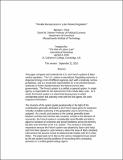| dc.contributor.author | Piore, Michael J. | |
| dc.date.accessioned | 2012-11-08T16:21:11Z | |
| dc.date.available | 2012-11-08T16:21:11Z | |
| dc.date.issued | 2011-01 | |
| dc.date.submitted | 2010-09 | |
| dc.identifier.isbn | 978-0-19-969361-0 | |
| dc.identifier.isbn | 0199669457. | |
| dc.identifier.uri | http://hdl.handle.net/1721.1/74598 | |
| dc.description | URL is to book. Chapter listed in TOC | en_US |
| dc.description.abstract | This paper compares and contrasts the U.S. and French systems of labor market regulation. The U.S. system is specialized: Regulating authority is dispersed among a host of different agencies each with a relatively narrow jurisdiction, and as a result with responsibility for a very limited domain. Authority is further divided between the federal and the state governments. The French system is a unified or general system: A single agency is responsible for the enforcement of the whole labor code. As a result, the French system is a street-level bureaucracy in which considerable power and authority rests with the line agents, the work inspectors themselves. The structure of the system (quite paradoxically in the light of the centralization generally attributed to the French state) gives the inspectors virtually complete autonomy in the geographic area to which they are assigned. As a result, and contrary to the contrast generally drawn between civil law and common law countries, at least in the literature of economics, the French system is considerably more flexible and able to adjust to variations in economic and social conditions across the territory but also over time than is the U.S. system. The contrast is of broader importance because the French system was adopted by Spain (and Italy) and from there spread to Latin America, where the issue of labor standards enforcement has become central to bilateral trade treaties with the United States. The paper goes on to discuss the various managerial issues posed by the two systems and the problems of reconciling their contrasting dynamics in a unified global trading regime. | en_US |
| dc.language.iso | en_US | |
| dc.publisher | Oxford University Press | en_US |
| dc.relation.isversionof | http://ukcatalogue.oup.com/product/9780199693610.do#.UJqNQmfIY5s | en_US |
| dc.rights | Creative Commons Attribution-Noncommercial-Share Alike 3.0 | en_US |
| dc.rights.uri | http://creativecommons.org/licenses/by-nc-sa/3.0/ | en_US |
| dc.source | Piore via Kate McNeill | en_US |
| dc.title | Flexible Bureaucracies in Labor Market Regulation | en_US |
| dc.type | Article | en_US |
| dc.identifier.citation | Piore, Michael J. "Flexible Bureaucracies in Labor Market Regulation." Chapter 23 in: The Idea of Labour Law, edited by Guy Davidov and Brian Langille, Oxford: Oxford University Press, 2011. 456 p. | en_US |
| dc.contributor.department | Massachusetts Institute of Technology. Department of Economics | en_US |
| dc.contributor.approver | Piore, Michael J. | |
| dc.contributor.mitauthor | Piore, Michael J. | |
| dc.relation.journal | Idea of Labour Law [edited book] | en_US |
| dc.eprint.version | Author's final manuscript | en_US |
| dc.type.uri | http://purl.org/eprint/type/BookItem | en_US |
| dspace.orderedauthors | Piore, Michael J. | en_US |
| dc.identifier.orcid | https://orcid.org/0000-0001-7717-6897 | |
| mit.license | OPEN_ACCESS_POLICY | en_US |
| mit.metadata.status | Complete | |
